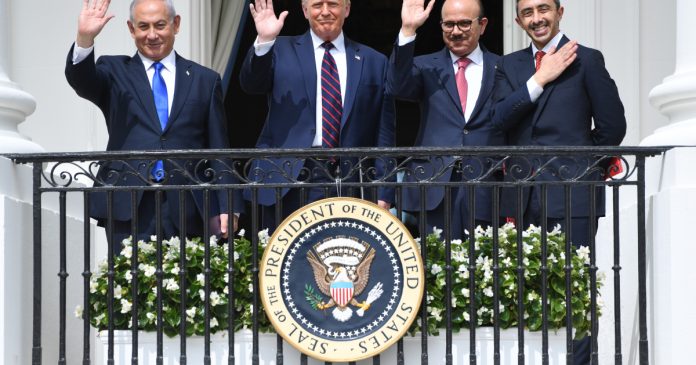[ad_1]
Former Trump adviser says strategy was to bypass Palestinians, isolate Iran and build political capital with Gulf states.
The Trump administration decided to go around the Palestinians to forge normalisation agreements last year between Israel, the United Arab Emirates and Bahrain, a former Trump official said.
Robert O’Brien, national security adviser to former President Donald Trump, said the Trump administration sought to build “political capital” with Israel first by moving the US embassy to Jerusalem and recognising Israeli sovereignty over the Golan Heights.
“We couldn’t allow the Palestinians to stand as a roadblock to a broader Middle East peace,” O’Brien said, describing for the first time since leaving office the strategy behind Trump’s diplomatic moves.
“So we went to our friends and partners and allies and we built political capital. And one way we built political capital in Israel was by moving the embassy to Jerusalem, one way we did it was by recognising the Golan Heights, as Israeli territory,” O’Brien said.
Former President Trump forged normalisation agreements called the “Abraham Accords” between Israel, the United Arab Emirates and Bahrain in September 2020. Additional agreements were reached to include Morocco in December and Sudan in January.
 National Security Adviser Robert O’Brien recounted the thinking behind the Trump administration’s drive to negotiate normalisation accords between Israel and Arab and Muslim states [File: Leah Millis/Reuters]
National Security Adviser Robert O’Brien recounted the thinking behind the Trump administration’s drive to negotiate normalisation accords between Israel and Arab and Muslim states [File: Leah Millis/Reuters]
Trump had announced in 2017 the US would move its embassy from Tel Aviv to Jerusalem and recognise Jerusalem as the capital of Israel. The move was celebrated in Israel but widely condemned elsewhere as detrimental to internationally supported Palestinian interests.
Trump unilaterally recognised Israeli sovereignty over the Golan in 2019, contravening international law. Israel had seized the territory from Syria in the Six Day War of 1967.
“These were facts that were never going to change on the ground. Jerusalem was never going to change being the capital of Israel. Israel was never going to give the Golan Heights back to Assad or any other regime in Syria,” O’Brien said.
“We did the same thing. We built political capital with Bahrain, with Morocco with the UAE by letting them know that we would stand with them, by getting out of” the Iran nuclear deal “which was a serious threat to the region”, O’Brien said.
The 2015 United Nations-backed Iran agreement was “providing the Iranian regime with so much money, so many funds, to export their revolutionary ideology,” O’Brien said.
Trump unilaterally withdrew In 2018 from the Iran nuclear agreement which had been negotiated by his predecessor President Barack Obama. Now, President Biden is moving to open negotiations with Iran to revive the agreement.
“We then took that capital and used it to bring the parties together and to see if we could bring them to some sort of accord, which we did,” O’Brien said.
O’Brien’s remarks came during a panel discussion hosted by the US Institute for Peace in Washington that included President Joe Biden’s National Security Adviser Jake Sullivan.
Other Arab states are likely to join the Abraham Accords as they see economic benefits and the new relations should allow the US to draw down some its military forces in the region, O’Brien said.
Among the benefits, O’Brien said the accords should allow Israeli entrepreneurs to raise capital from Arab sovereign wealth funds.
“It boxes China out of Israel’s tech sector to some extent, which is something I looked at very carefully,” O’Brien said.
Biden adviser Sullivan said the new administration intends to build on the Abraham Accords. The new president is “thinking about how we make sure that the seeds that have been planted actually grow into the kind of full cooperation” that has been promised, he said.
Separately, Secretary of State Antony Blinken had told the US Senate on January 19 the Biden administration would be taking a close look at the incentives Trump had offered the UAE and Bahrain to enter the accords.
O’Brien said he still hoped for a peace agreement between Israel and the Palestinians and suggested other Arab states like Saudi Arabia would join in future.
“We weren’t able to get the Palestinians. I wish we had been. But there are a number of carrots and sticks that’ll bring them to the table,” O’Brien said, adding that he thinks European nations will help when they “see the success” of the Abraham Accords.
[ad_2]
Source link











